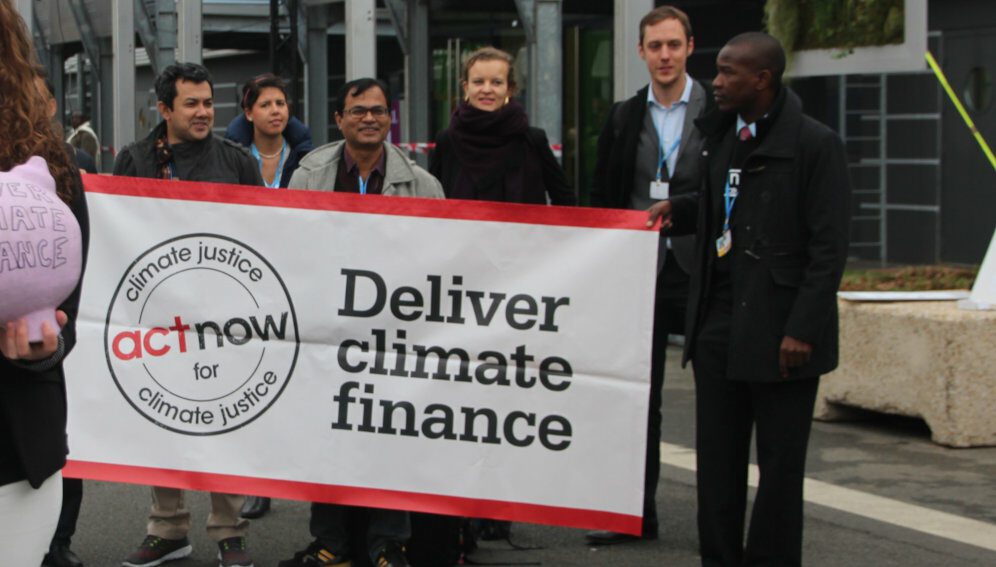21/10/21
Climate finance ‘critical for developing countries’ at COP26

By: Fiona Broom
Send to a friend
The details you provide on this page will not be used to send unsolicited email, and will not be sold to a 3rd party. See privacy policy.
Climate leaders from the global South have a clear message for governments ahead of the COP26 UN climate talks: stop talking and start acting.
Communities in the developing world are living with the most severe impacts of the climate crisis, despite being least responsible for the greenhouse gas emissions that contribute to global warming, a SciDev.Net debate heard Wednesday.
And as extreme weather events increase in frequency and intensity, climate leaders say their patience with uncooperative political and industry heads has run dry.
“The only way to recover is to work together actively, and by listening especially to the needs of the most vulnerable, because they’re the ones who are most impacted.”
Ineza Grace, youth climate leader
“World leaders, please stop talking and start to act,” said Samir Tantawi, a former member of Egypt’s delegation to the UN climate conference and co-author of an Intergovernmental Panel on Climate Change (IPCC) report on greenhouse gas inventories.
“We’re on very critical time, according to the science and IPCC recent reports. Everyone knows what’s need to be done and what every country can do.”
Parties to the United Nations climate change convention are bound by the 2015 Paris Agreement to limit global warming to below two degrees Celsius, with a focus on staying below 1.5 degrees. The world is not on track to meet this target and many view COP26 as the last chance for effective climate action.
Alexandre Antonelli, director of science at the UK’s Royal Botanical Gardens, Kew, said the world could not afford to miss the opportunities available at COP26, being held in Glasgow, Scotland next month.
“In the last decade we completely failed at achieving the Aichi targets for biodiversity,” Antonelli said. “We need to do it differently: we need to see action, we need to see a plan and the finances to get it right this decade. Because it might be the last opportunity to make a change.”
Finance for climate-related loss and damage will be key among the issues that come under scrutiny at the COP26 climate negotiations. ‘Loss and damage’ refers to climate impacts that exceed a country’s ability to adapt or mitigate the effects.
Ritu Bharadwaj, climate governance and finance senior researcher at the International Institute for Environment and Development, said loss and damage was “the most important issue […] because it is happening now and vulnerable countries and communities around the world are losing their lives, their livelihoods, their homes — they’re getting displaced”.
“These issues will only escalate as climate change impacts get worse,” Bharadwaj said.
“We need urgent action at scale, because without that millions of lives will be put at risk. This requires commitment for finances, resources, capacity, infrastructure, for vulnerable countries to help them prepare, adapt and recover from these impacts.”
Indigenous community leaders will analyse national climate strategies and monitor official negotiations to ensure that suggested climate change solutions do not damage their land and lead to further displacements, said former UN special rapporteur on the rights of indigenous peoples, Vicky Tauli-Corpuz.
“What I would like to see is the inclusion of safeguards and human rights into many of these solutions being discussed,” said Tauli-Corpuz, a member of the Kankana-ey Igorot people of the Cordillera region in the Philippines.
“So that these solutions will not further marginalise indigenous peoples, and these solutions will also include them, there will be participation of indigenous peoples in deciding how these solutions are being made, especially as it concerns their lands, territories and resources, and of course their traditional knowledge.”
Youth climate leader Ineza Grace said that women and young people in rural areas were facing the biggest climate impacts. She said that while there was significant recovery support after extreme weather events in wealthy countries, the same disasters in the global South received “not even one dollar”.
“It’s kind of painful,” Grace said. “We need to step up, not only global North countries, we all need to step up and try to tackle climate change impacts with a sense of urgency. The IPCC report pointed out very clearly, we are all in the red zone, and everyone, everywhere, is exposed.
“The only way to recover is to work together actively, and by listening especially to the needs of the most vulnerable, because they’re the ones who are most impacted.”
Martin Muchangi, a water, sanitation and hygiene specialist at Amref Health Africa — a member of the WHO-Civil Society Working Group to Advance Action on Climate and — said that both infectious and non-communicable diseases were rising as a result of climate change.
Malaria mosquitoes are able to live and breed in new areas, he said, while pollution is affecting lung health.
“A healthy planet is healthy people,” Muchangi said. “If you look at neglected tropical disease like trachoma — whereby you require water to wash your face and keep basic hygiene — because of drought, water is dwindling in the global South.”
The global community had hoped to eradicate trachoma by 2020, he said. “Now we are restarting the battle again. Although we are setting ourselves for 2023, I’m not sure. If we don’t do serious interventions around climate change mitigation and adaptation, then those health targets are unlikely to be met.”
An open letter signed by more than 450 organisations representing 45 million health workers has called on national leaders and COP26 country delegations to put “human health and equity” at the centre of climate action.
This piece was produced by SciDev.Net’s Global desk.














